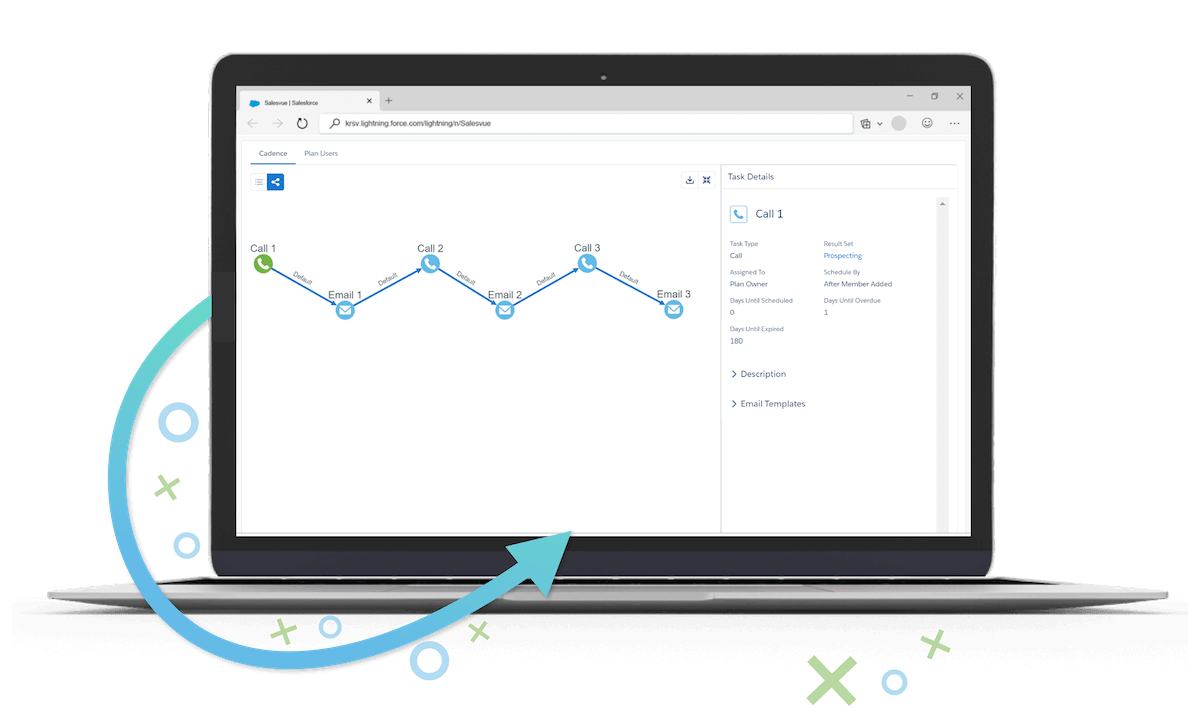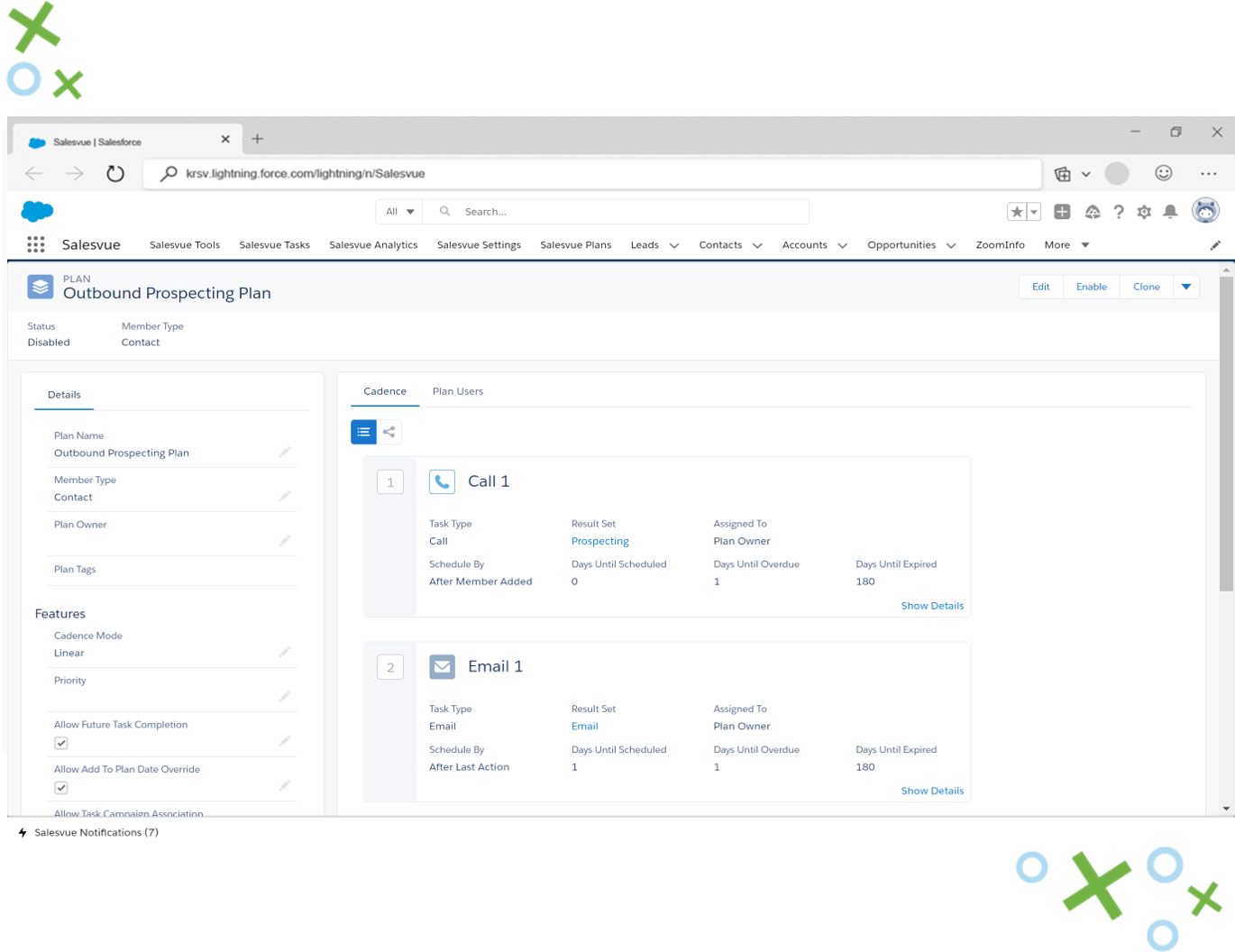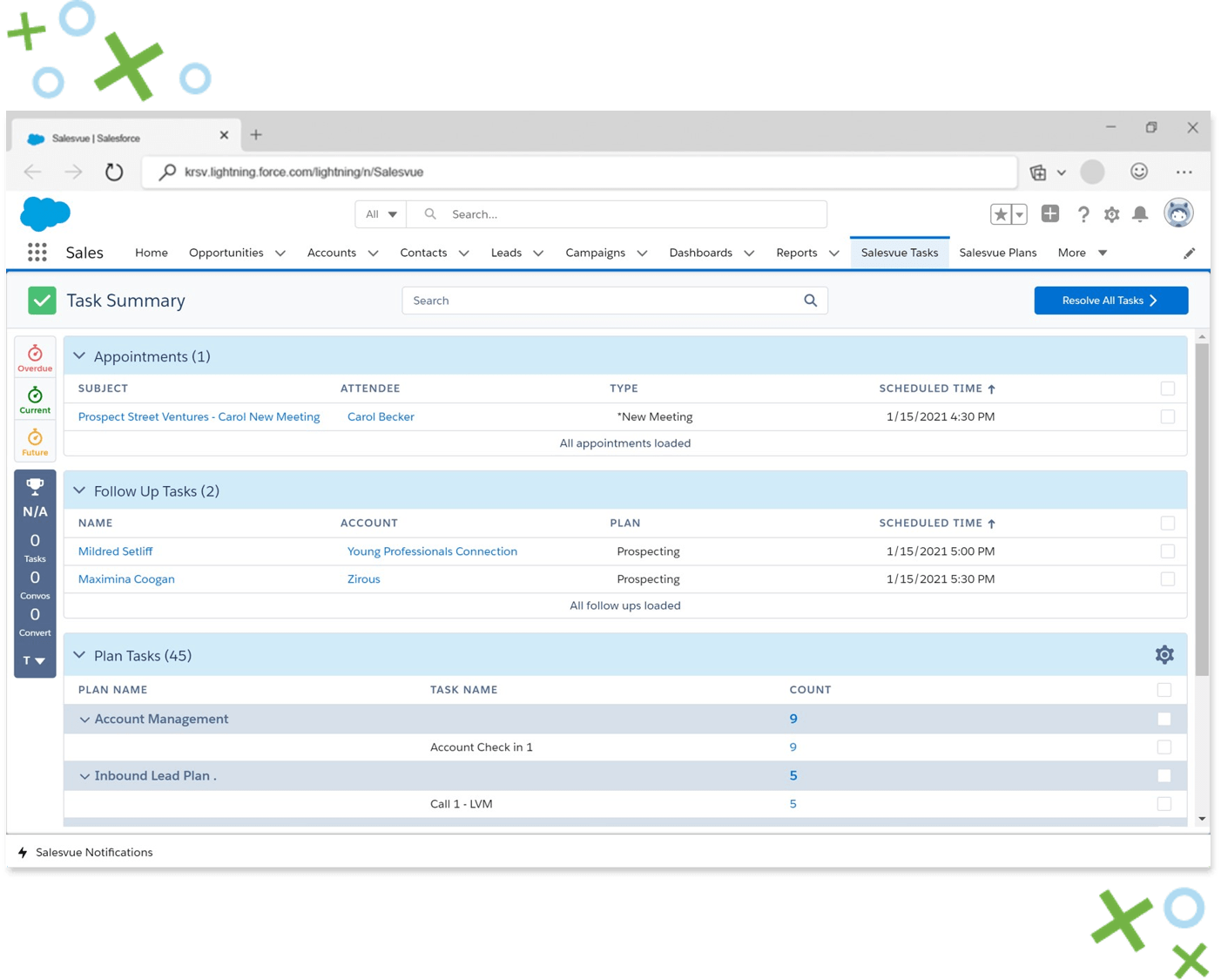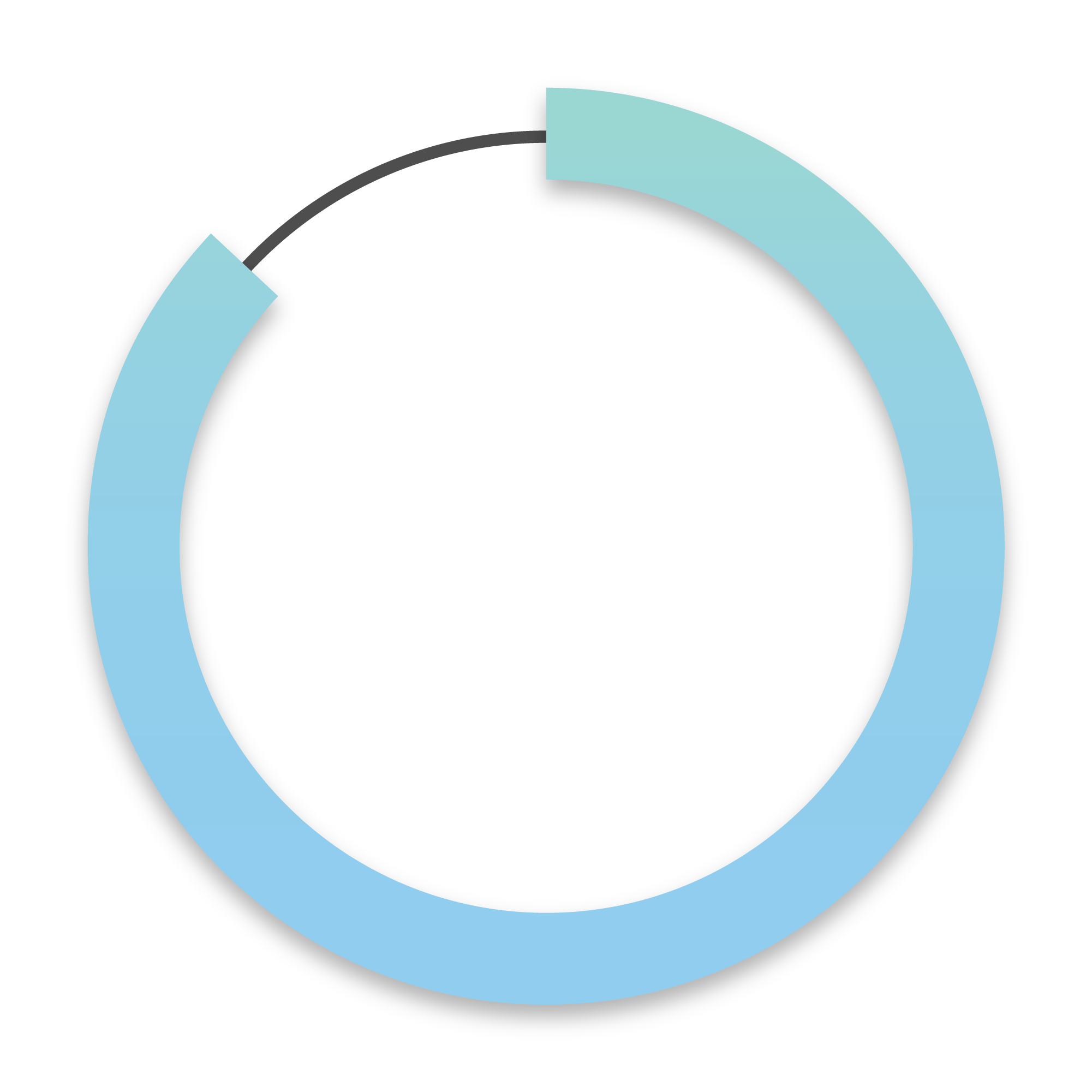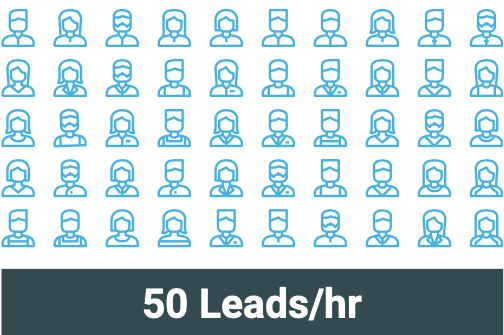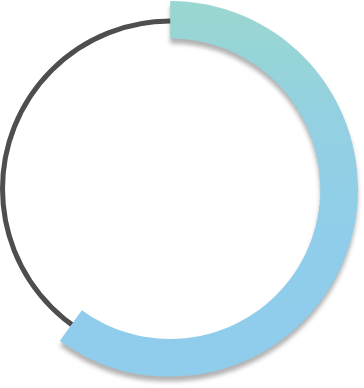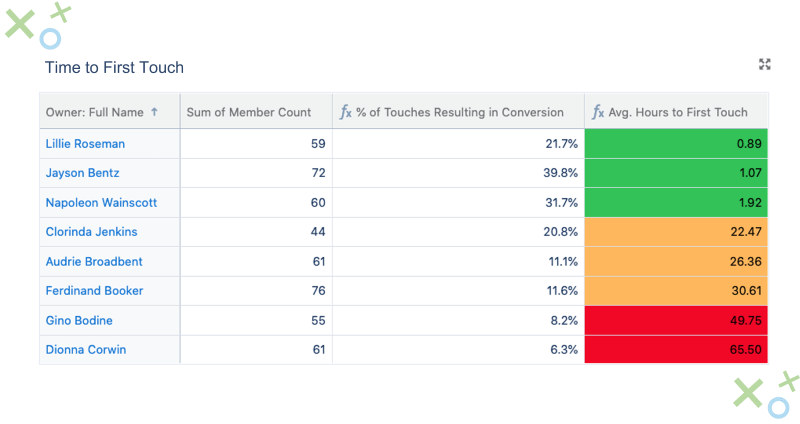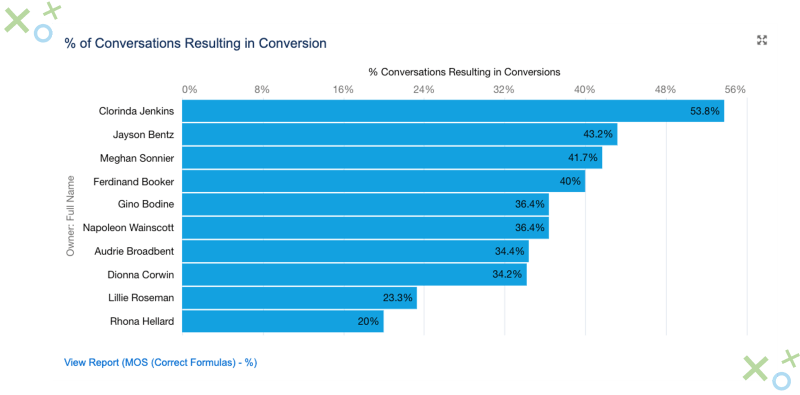What is a sales engagement platform?
A sales engagement platform is software that helps your sales team engage with prospects and customers across multiple channels by helping sellers stay organized and streamline their work day through cadences, automation, and integrations with other sales tools.
Sales engagement platforms include built-in communication tools for emailing, calling, and sometimes social media interaction to make it easy for sellers to do all their work in one place, and easily complete tasks and move on to the next prospect or client to touch. Cadences provide sellers structure so they know what to do next and when, and can be more efficient and focus on selling over administrative tasks.
What a sales engagement platform is NOT
Sales engagement platforms are not marketing automation platforms. Marketing automation platforms produce leads. However, their use in the sales cycle ends there. These platforms, unlike SEPs, do not facilitate engagement between sellers and prospects.
Sales engagement platforms are not CRMs. CRMs, like Salesforce, are tools used to help track and hold sales data. Yes, a CRM platform is essential for every sales team. However, trying to use them as a SEP is very time-consuming and inconvenient.
Why you need a sales engagement platform
The use of sales engagement platforms is quickly becoming necessary in the eyes of team leaders. Many leaders have realized that technology like SEPs is the best way to increase their effectiveness and efficiency. Check out these findings from two Salesforce articles about customer engagement and customer expectations.
-
56% of customers look to buy from innovative companies
-
59% of customers want businesses to have the newest tech
-
76% of customers expect communication from multiple channels
-
83% of customers look for immediate engagement from a company
Sales engagement platforms help organizations close more deals by helping them scale relevant or even personalized messaging, so engagement with prospects and customers is better and more efficient. And because there’s a system in place, ramping sales reps is much easier, so a sales team doesn’t have to suffer through teammate transitions.
Sales engagement platforms no doubt make your sellers’ days easier, but they also provide for incredibly insightful analytics. Because your team is using systematized sales processes and recording results easily, it provides much better data for continuous improvement.
A sales engagement platform can show you which cadences work best, which reps are best at generating conversions, what days are best to reach out to prospects and customers, and much more; all of which can be used for coaching or continuously updating and improving processes.
Features and benefits of a sales engagement platform
Sales engagement platforms provide many benefits for teams. They help manage the seller and prospect or customer relationship from beginning to end. Sales engagement platforms can help teams close more deals in less time. Here is how:
-
Phone services such as click-to-call, live agent power dialers, and voicemail drop templates save time while ensuring prospects and customers get the attention they expect.
-
Automated emails, email scheduling, and the ability to send both one-to-one and one-to-many emails allow personalized messages to reach prospects at just the right time, while A/B testing helps reps focus on the right messaging.
-
Lead generation content is available 24/7 in the SEP so that sales reps can provide prospects with value-added information at the appropriate time during the buying journey.
-
Reports that tie sales activities to marketing initiatives allow sales teams to save time and identify the most productive plan at any stage in the sales cycle.
-
Automatically triggering other activities or actions based on the outcomes of the sales team’s defined activities gives customers a personal experience while cutting down on administrative time.
-
A platform that is native to Salesforce (such as Salesvue) gives reps a single interface that lets them communicate with customers without syncing or needing to update data in multiple places. Salesvue users do not ever have to leave Salesforce, and neither does any important prospect or customer data.
-
Multiple follow-up plans based on account or persona provide structure to help sales teams improve the conversations-to-qualification ratio more efficiently.
-
With customized best-practice cadences, a SEP lets sales teams take advantage of the best sales behaviors in their organization.
-
A platform with a mobile app allows inside and outside sales teams to be on the same page, documenting meeting details and moving opportunities forward in real-time.
How do you choose a sales engagement platform?
While there are numerous options on the market, there is usually the best fit for your team and current situation. One key part of finding a great fit is evaluating which CRM you are using, specifically, if you are using Salesforce or not.
If your team uses Salesforce, there are sales engagement platforms that live natively within Salesforce. These platforms are great for teams that are used to using Salesforce in their day-to-day activity and want to avoid some of the common issues of working in and syncing multiple platforms.
Introducing another external sales tool is often counter-productive, especially for sales teams with account executives and BDRs collaborating to generate new business. Using a non-Salesforce-native tool is not appealing enough to the whole team to adopt it. They’re comfortable enough with shared docs or spreadsheets.
For that reason, it’s best to choose a Salesforce-native platform that the whole team will buy into, and they can all operate efficiently within Salesforce.
One Salesforce-native solution that is different from others is Salesvue, since it is the only platform that looks and feels exactly like Salesforce.
Must-have features to look for in a sales engagement platform:
-
A single interface for daily tasks, so sales reps don’t have to wonder about who to contact, what to say, or how to engage prospects.
-
Cadences and automated workflows provide the structure for consistent and efficient engagement, whether outbound prospecting, quarterly touchpoints, or anything in between.
-
Email scoring, so there’s never a question which clients and prospects should get priority.
-
Real-time activity data, so you can get insights to coach sales reps and make strategy adjustments.
-
Telephony suite, including features such as click-to-call, call tracking, call recording, listen & barge, live agent power dialer, and recorded voicemail drop.
-
Email features such as automated emails, bulk email & scheduling, templates, A/B testing, real-time notifications, deliverability tracking, email prioritization, mail merge, and the ability to send rich media.
-
Analytics that provide you with reports that tie sales activities to marketing initiatives so you can save time and identify the most productive plans.
Other considerations when picking the best platform for your team.
-
Does your team need one with a mobile app? Mobile apps can be very helpful for outside sales teams in the field and need to be able to update the CRM quickly so the whole team can be aware of what’s going on with each deal.
-
What are you looking for out of a dialer or email features? Make sure you think about what will make things easier on your team, such as using automated emails or having a built-in dialer.
-
Does the tool integrate with other systems you’re already using? The worst thing you can do for adoption is to pick a new system that they have to learn that also doesn’t work with other tools that sellers are using. Then you have disparate data and the team loses efficiency working in too many systems, and doesn’t have a single source of truth.
-
How important is meaningful analytics to your team? Ensure that you will not have any data syncing issues that will make reports untrustworthy. Do some research on what reports are available, so you can make sure you’ll be able to dive into metrics that matter for your organization.
Is Salesforce a sales engagement platform?
The simple answer is Salesforce is not a sales engagement platform but does have one to purchase. This platform, however, is not nearly as robust as others that are available. If you are looking for the best Salesforce experience out of your sales engagement platform, Salesvue (on the AppExchange) is the way to go.
What is the best sales engagement platform?
Salesvue provides everything your team needs to help with sales engagement. As mentioned, it lives natively within Salesforce, meaning you avoid common troubles other non-native platforms run into. It provides the tools needed to scale your efforts effectively while also providing meaningful analytics that helps drive future business. Salesvue is the easiest to use and most powerful Salesforce-native sales engagement platform.
What is the difference between sales enablement and sales engagement?
While they are often used interchangeably, sales enablement and sales engagement are not exactly the same. Sales enablement platforms and sales engagement platforms mainly differ in how they help a sales team.
Sales enablement platforms often have features that enable sellers by keeping sales and marketing content organized and even providing recommendations for what to send a prospect or client using artificial intelligence. They sometimes have tools to help sellers create or personalize content on the fly.
Sales engagement platforms focus more heavily on executing the strategy throughout the sales cycle with structured (and sometimes automated) cadences. We like to think of sales engagement and sales enablement as a 1-2 punch of cadence + content to send the right prospect the right message and content at the right time.
Both sales enablement and sales engagement tools help your sales team engage more effectively with prospects and customers to close more deals.
Let’s take a look at how Salesvue meets some common criteria for a sales engagement and sales enablement platform.
-
Salesvue equips sales teams in so many ways by managing the customer engagement process from beginning to end to close more deals in less time. The rich features and benefits of the platform are worth taking some time to explore.
-
Training and coaching are easy with Salesvue. You can put established, automated workflows and processes in place so new hires don’t have to wonder about who to contact, what to say, or how to engage prospects. Sales managers can record calls to help with coaching, and they may listen in and barge into calls in progress to help reps communicate messages clearly. Plus, you reduce the time it takes to onboard new reps with a central repository for call scripts, sales playbooks, competitor overviews, client reports, and any information that helps sales reps.
-
Engaging customers is quicker and easier with Salesvue’s Salesforce-native platform. Automation rules can immediately add new prospects to a follow-up or nurture cadence. Reps can use email templates and call scripts to guide their conversations but still customize their message for each rep. With automated emails and task completion inside Salesforce, sales reps can work quickly through tasks and know exactly who to contact and when.
-
Assessing what works and what doesn’t is a strength of Salesvue’s platform. Salesvue provides you with the reports that tie sales activities to marketing initiatives so you can save time and identify the most productive plans. And because Salesvue is native to Salesforce, you get full pipeline analytics all in one place. With a single click, it’s easy to access your pipeline data, save time, and allow managers to make strategic decisions quickly based on the status of your pipeline, including the number of leads, deals in progress, reps nearing a close, and leads falling off track.
-
Recruiting and hiring are easier when you have determined what traits and behaviors your best salespeople possess. While Salesvue doesn’t have a recruiting and hiring function, it does reveal your best salespeople and sales behaviors based on actual data. With Math of SalesTM reporting, you can be sure to eliminate faulty assumptions that sales managers often have regarding who their best salespeople are.
-
As far as sending the right content at the right time, Salesvue doesn’t natively have a content repository, but through integrations or browser extensions, it can work seamlessly with tools like Seismic and Highspot to share relevant content through automation or structured cadences to key prospects or clients.
Are you looking for a customer engagement platform?
If you are looking to increase your customer engagement, you may have started by searching for a customer engagement platform. Basically, the terms sales engagement platform and customer engagement are interchangeable. Customer engagement is essential to building a lasting relationship with your customers by interacting with them throughout all steps of the customer journey, from prospecting to after they have become customers. No matter which term you search, be sure to compare platforms based on your team’s needs.
Does Salesforce have a sales engagement platform?
Many teams in the market for sales engagement platforms are also leveraging Salesforce. For those not aware, Salesforce does offer a sales engagement platform called High Velocity Sales. However, this option comes with many roadblocks. High Velocity Sales isn’t nearly as built out and robust as other platforms. For example, you can’t put a contact in more than one cadence with HVS. For teams using Salesforce looking to leverage all the capabilities of a sales engagement platform, they’re better off looking for a Salesforce-native platform, like Salesvue.
Sales intelligence tools and sales engagement platforms
Sales engagement platforms play nicely with other tools in your tech stack. For the best prospecting help, many teams look towards sales intelligence tools. These tools, such as LinkedIn Sales Navigator and SalesIntel help teams make informed decisions by offering the information you need to connect better with your ideal prospects. These tools can be seamlessly integrated with Salesvue within your Salesforce, allowing this process to become even easier for sellers.
What is a sales engagement model?
A sales engagement model can help teams gain the maximum benefit from a sales engagement platform. While it’s one thing to have access to these amazing tools, it’s another to use them to their maximum potential. So, by outlining a model that helps define specific processes, stages and strategies to be used in a team’s sales engagement efforts, there’s a better chance your SEP will be used as well as it can be.
What is an account engagement platform?
An account engagement platform is a solution that helps connect you with a customer account. In enterprise deals and many times in B2B sales, you’re constantly communicating with more than one person from an account. So, it’s crucial that you have a solution, often your sales engagement platform, that can act as this account engagement platform. With Salesvue, you can create cadences that target entire accounts. So, you can have different tasks for individuals at the account, making it easier for you to target accounts in your selling efforts.
Sales engagement platform market size
The sales engagement platform market is worth billions of dollars, and is expected to more than double in the next 10 years. According to Fact.MR, the market is valued at $7.4 billion in 2022 and projected to be nearly $30 billion in 2032. This space is looking to boom over the next decade. With more and more solutions becoming available, it’s important to remember there’s only one that is the easiest to use and most powerful Salesforce-native solution, Salesvue.
What does Gartner say about sales engagement platforms?
We like to pride ourselves in being experts in many areas, so we like to trust experts in others! When looking for new technology trends or ideas, many people turn to Gartner. For those wanting to find everything sales related, Gartner is a great place to start. To see what they have to say about sales engagement platforms and why so many organizations are adopting them, check out this definitive guide!



